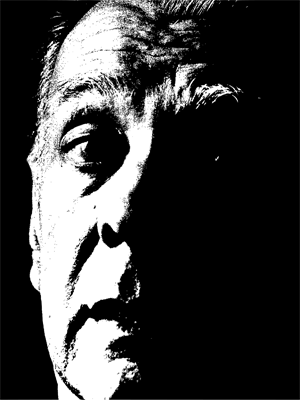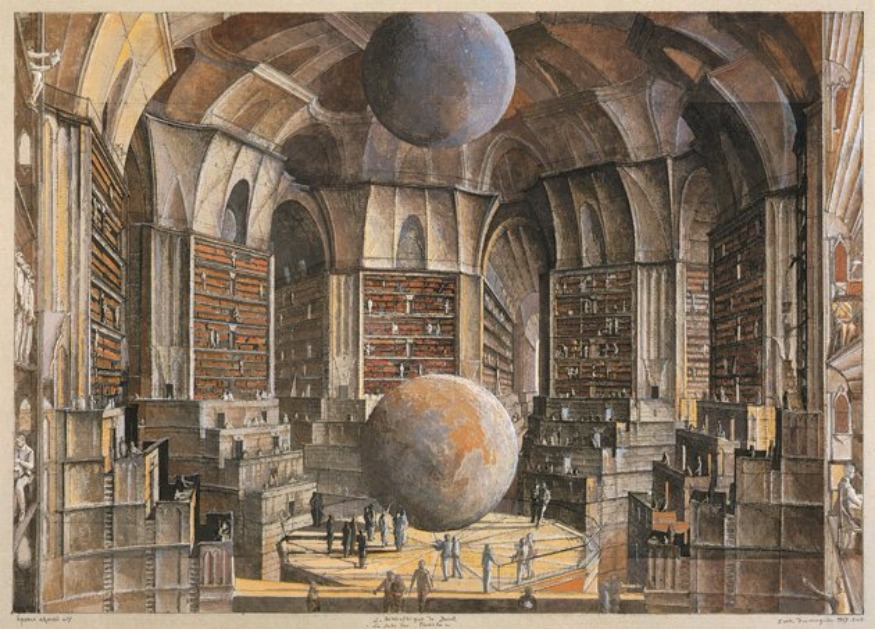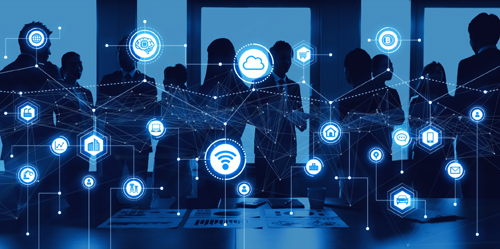
Your complimentary articles
You’ve read one of your four complimentary articles for this month.
You can read four articles free per month. To have complete access to the thousands of philosophy articles on this site, please
Society & Reason
World Wide Web or Library of Babel?
Marco Nuzzaco wants us to see the net as something more than a library.
Safer Internet Day 2023 is 7th February. I anticipate that like last February, the internet will be teeming with meetings, webinars and talks to discuss issues related to cyberbullying, privacy, trolling, democracy, and freedom of speech.
No doubt all these issues are affecting more and more lives and experiences, both on- and off-line. These days we talk about the infosphere, a word used by Italian philosopher Luciano Floridi to describe the space of data and information in which we are all connected together, as well as our artefacts and devices. The infosphere is becoming increasingly populated, and we are increasingly dependent on the internet, a big chunk of said infosphere. According to Digital Information World, the world average time per day spent using the net via any device is 6h 42m. Moreover, according to Statista.com, in 2020 there were 59 zettabytes of data created, captured, copied and consumed in the world; yet by 2024 we will reach 149 zettabytes. (One zettabyte is equivalent to 10²¹ bytes – that is, 1,000,000,000,000,000,000,000 bytes.) Also, at the moment there are over 2 billion websites in the world. Of these, less than 200 million are active. This shows not only how big the world wide web is becoming, but that a necropolis of dead information is emerging around the world too.

Jorge Luis Borges in 1968
Borges 1968 © Eugenio Hansen, OFS Creative Commons
These considerations give the internet an appearance similar to the infinite book collection which Argentine author (and librarian) Jorge Luis Borges (1899–1986) describes in his 1941 short story ‘The Library of Babel’. You can find it in his collection Labyrinths, among other places. Borges imagines a library made of an unending intricate complex of hexagonal galleries and corridors and staircases: ‘’a sphere whose exact centre is any one of its hexagons and its circumference is inaccessible.’’ On the shelves are identically-sized books which contain all the history and mysteries of humanity, since together they contain all the combinations of letters and characters it is possible to fit in equal-sized books. These books contain all languages, past and unknown; some are encrypted codes; others are imitations or almost exact copies of originals; others contain false information; most contain just nonsense, ‘’cacophonies, verbal jumbles and incoherences.’’
This is also what we find on the internet. One can argue that most of the more than 59 zettabytes it hosts is not relevant information. One could also argue that most of the bytes are not even made for us humans, but for other machines and artefacts, to enable communication with us and with other artefacts in order to transfer and process information. The internet has also its catalogues, and catalogues of catalogues: information about other pieces of information, its organisation and storage. We do not find hexagonal galleries, but server farms and data centres which support and sustain cloud storage systems throughout the world.
There are some other fundamental differences between Borges’ library and the internet. The basic structure of the compositions that compose the library of Borges is the alphabet, including ‘’the space, the period, the comma, the twenty-two letters of the alphabet…’’ The Library of Babel contains all possible combinations of those symbols and – Borges says – the combination of these elements, no matter the language, “made it possible to discover for a librarian of a genius the fundamental law of the library.” By contrast, in the case of the internet, ultimately binary mathematics and its syntax is the basic language from which all the other languages, symbols, and semantics are translated. Apparently Galileo’s statement that the world is a book written in mathematics is true even if the world is not natural, but artificial and virtual.
Hyperhistory & Its Challenges
However, perhaps the most fundamental difference between the library of Borges and the internet, is that the former, Borges says, exists ab aeterno. It was always there – whereas the net is roughly thirty years old. This does not mark only a simple difference of age, however, but a deeper difference in the very nature of the two libraries. The Library of Babel contains all the knowledge of the universe that we can possibly gain. It has always been there, and it always will be. In this sense, the knowledge of the library reflects the universe from a God’s eye perspective, and the librarians’ relentless research is to decipher its secrets and its mysterious order and purpose – or maybe, as Borges wonders, the ultimate lack of any of these.
When it comes to the internet, we should not forget that its nature is at once both human and artificial. If the world wide web is not a good imitation of the natural world, it could be said that at least it reflects one way in which we humans are shaping and transforming the world. We are like demiurges who manipulate, process, control, model, edit and communicate the data flow that we produce. To use Italian philosopher Luciano Floridi’s words (see for example The Philosophy of Information, 2011), the net is not a mimetic artefact but a poietic one – meaning that our autonomous action not only copies or is informed by but reshapes the world. What we are building is more than just a universal encyclopaedia which contains everything that we know and which we consult when we need to. Instead, we inhabit the ‘library’ of the internet not just as viewers, consumers and users, but also as creators and editors – as seen very clearly with Wikipedia or YouTube.
We can say that history starts with our ability to record our past and its ideas. If this is a definition of history, then Floridi argues that we’re now living in hyperhistory, in which we don’t just record information, but are dependent on it. Now, information and communication technologies “record… and above all process information, increasingly autonomously, and human societies become vitally dependant on them and on information as a fundamental resource in order to flourish” (The Fourth Revolution, p.6, 2014).
The transition from history to hyperhistory comes with a lot of challenges and uncertainties. The first big challenge concerns the amount of information we’re producing. The amount of information produced on the internet in the span of ten years from 2010 to 2020 is exponentially and incommensurably larger than all the information produced by humanity in the course of its previous history. According to Google’s algorithms, nearly 130 million books have been published in the course of modern history, since Gutenberg’s invention of the printing press in the 1450s. But this is only a very small slice of the information pie we are currently producing and consuming online.
One can find these facts daunting and discouraging, precisely because one could find the task of organising this information flow almost impossible. This is also because we are not only sat on this pile of information, we are also transforming, processing, and editing information which is constantly accumulating, and all this at an exponentially faster pace.
The projection that we will reach 149 zettabytes by 2024 presents even more difficult challenges. What information is worth preserving, and what should we delete? What information will soon be irrelevant and outdated, and which bits (or I better say bytes) will be essential to our knowledge for our future? And how and where will we store all this information? And how can we orientate ourselves in this scenario? What is the best way to find our whereabouts?

The Library of Babel book cover, 1941
A New Account of Knowledge
We can no longer consider ourselves as passive, static viewers who walk through the corridors of a library, leafing through the pages of volumes and catalogues – however extensive the library. The Enlightenment ideal of a universal encyclopaedia as the reservoir of all human knowledge and as the mirror of nature is no use to us. To find our ways about in the new ‘library’ we have built, we need an idea of knowledge as a dynamic process, which does not place us as passive recipient of information, but instead takes into account our role as active editors.
Floridi’s network theory of account provides such an approach (see for example Philosophy of Information, pp.267-289, 2011). In a nutshell, the theory is based on the idea that ‘ to be informed that’ is different from ‘ to know that’. Floridi first argues that any piece of information can be split into questions and answers about it. If somebody knows that ‘Paris’ is the right answer to the question ‘What’s the capital of France?’, that someone then is informed about it. But one can say that one knows that ‘Paris is the capital of France’ if one is able to connect that answer to other, related questions, such as, ‘How do you know that Paris is the capital of France?’, ‘Since when has it been the capital of France?’, ‘Why is Paris the capital of France?’, and so on. All these pieces of information together form a network of answers whereby rather than simply being informed, one knows that Paris is the capital of France, because the information is placed in a ‘’web of mutual relations that allow one part of it to account for another’’ (p.288). This makes our knowledge something more than just the information we have. It’s the set of relations between different pieces of information, held together by questions and answers, that forms what we know. Moreover, the network of information that we hold makes us not simply informed about, but also accountable for, what we know. To put the idea simply, the more questions we can answer, the more accountable we are for what we know.
Three Questions for Digital Citizens
This approach to knowledge as an ‘information network’ is surely well adapted for our life in the infosphere. Yet not all the questions we might ask in this regard are the same. Indeed, three different types of questions can be helpful to better approach and use the internet:
1. ‘What questions’: questions about content.
2. ‘How [we know] questions’: questions about reliability, authenticity and transparency.
3. ‘Why questions’: open questions.
The first type of question are the ones we might ask when we research a particular topic on Wikipedia or another website because we want some information – for instance about a company or institution, its structure and purpose, before applying for a job, or about submitting a document for an application. These sorts of questions are often prompted by our insipience. Floridi reminds us that insipience is different from ignorance. We are insipient when we have a clear question about something but we lack the answer. When I ask whether Paris is the capital of France, I do know that France has a capital, and I want to know which city that is. By contrast, I would be ignorant if I do not know that France exists at all, or that it has a capital.
This distinction between insipience and ignorance can be helpful for at least two reasons. First, it guides and drives our inquiries. At the same time, it serves as a reminder of what we know and do not know. According to the network theory of account, each question leads to answers that consequently lead to other, related questions. The questions that we have, which form our insipience, can goad us to ask further questions, and so to reduce the scope of our ignorance, even if we do not have all the answers. That is, by asking more questions about what we can possibly know, we reduce the scope of what we ignore. It can then be said that by becoming more insipient – asking more questions about ‘known unknowns’ – we become less ignorant. Insipience can be a good thing then, as it can help us to look for what we do not yet know, and, at least as a reminder, to think about we can ask.
The second type of questions are about the reliability and authenticity of our information. By asking questions such as: Where does this information come from? Is the source reliable? Do you have further evidence to back this up? and, Is this reported elsewhere?, we become more critical towards the flood of information in which we’re immersed. Consequently these questions enable us to identify and isolate fake news, for example.
The third type are questions open to discussion, and they emerge from a critical attitude towards problems. Good examples are ethical questions such as What should I do? How should we act? Or, why should we take this course of action over another? Open questions are ones that the internet cannot answer – or at least not definitively. Yet sometimes such questions deal with problems posed by the internet itself – concerning digital democracy, freedom of speech, privacy and cyberbullying, for example, which are about the ethics of our life online. Other problems, such as increasing world inequalities, hatreds, war and climate change, are also reflected, discussed, and absorbed by the net.

The New Library of Babel?
Internet Graphic © Mang-internet 2022 Creative Commons
New Openings
We know that we have a lot of information at our fingertips, true. But what we need is a critical sense to establish links between, on the one hand, what’s now easily accessible from everywhere, at any time and by anyone, and on the other hand, the problems that we share and that we need to face. The internet makes information easily available, and as it connects people with each other, it makes us citizens of a globalised world. So what we ultimately need is an idea of digital citizenship: we need to learn how to behave and live together on the internet as a new space we are building and shaping for humanity. The idea of digital citizenship involves learning and recognising what rights, duties and obligations we own to each other in the infosphere. This can be achieved only through thinking, evaluating, discussing and deciding. The digital world is not only the means but also an opportunity we now have to join forces, discuss and cooperate as global citizens. And only the third type of question’s critical reflection, dialogue, and cooperation can guide us towards good answers and good decisions.
Critical awareness and an attention to problems, however, is not found in any volume of any library. This is also why our third type of questions – open discussion questions – should be at the core of education in the age of information, and should inform any teaching that aims at promoting the idea of digital citizenship. This should not be conceived as a new subject taught in isolation from others. Rather, it is a methodological idea which should support the practice of teaching how to critically assess problems raised by the digital across subjects. If these open questions can be of any help, this is to guide us to become critical users of the internet, avoiding disinformation and the illusion of omniscience that the web can so easily generate. The allure of potential omniscience is the pit the protagonist of Borges’ story falls into. At the end of his life he is about to die in one of the corridors of the library, without having found the book with all the answers – the catalogue of catalogues which would reveal him the order of the library of Babel, and so tell him how to discover whatever he wants to know.
If there is a lesson we can draw from that story, it is that we must recognise that any desire for full knowledge, and any idea of a final order emerging from that, is nothing but an illusion. Instead, it is both reassuring and liberating to see our knowledge as a limited part of a vast network which we can always expand. Furthermore, we should not forget that we constantly share this knowledge with others.
So we must reject the idea that the internet is the place where we can find all the answers. Instead of it being an infinite library, it would be better to view the net as a new space we are inhabiting and spending a considerable part of our lives in. As newcomers in a new city or a new country, it is not necessary to know all its places and all its nooks and crannies. As new citizens, it will be enough if we contribute to making it a better place, aware of the advantages that we enjoy as well as of the challenges and problems that we face.
© Marco Nuzzaco 2023
Marco Nuzzaco is a teacher of Philosophy and Ethics at Notre Dame High School in Norwich.









